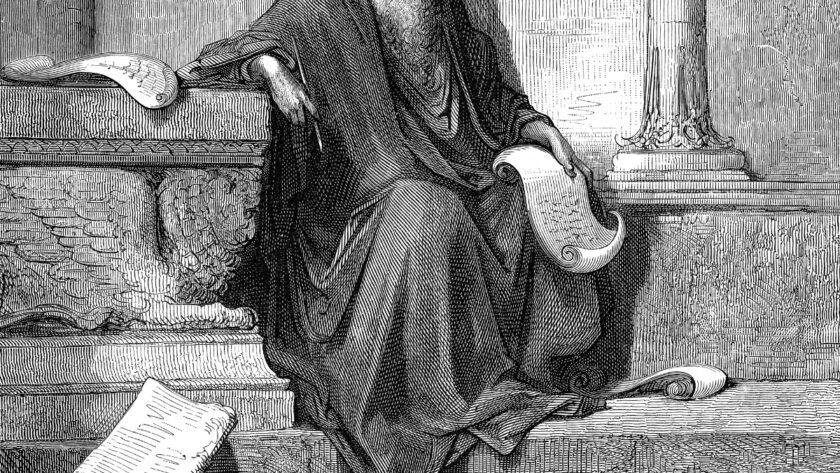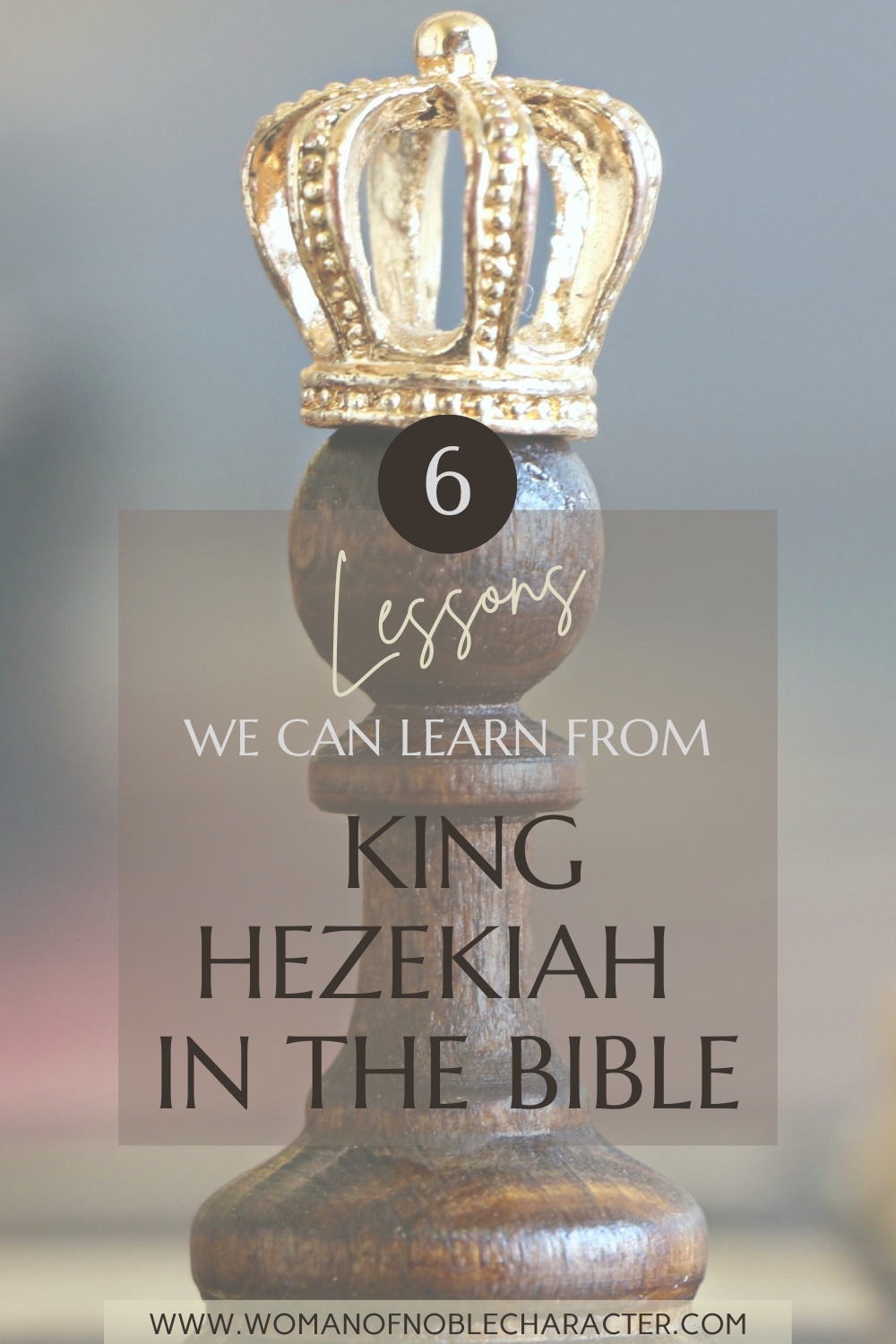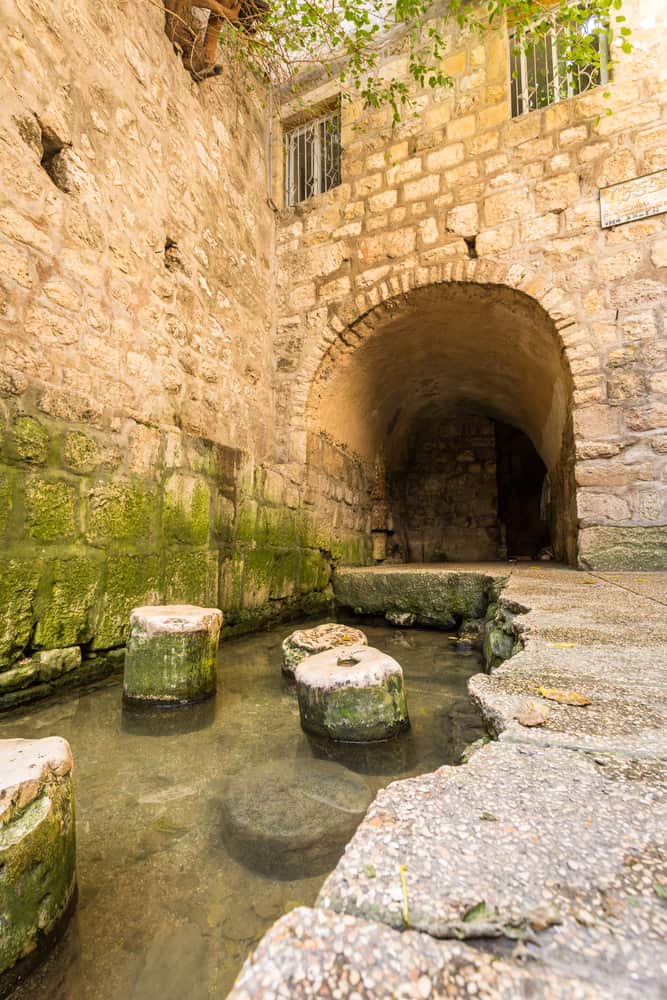King Hezekiah in the Bible and 6 Important Lessons We Can Learn From His Life and Choices

In this post, we’ll discover King Hezekiah in the Bible, his story, King Hezekiah’s prayer, and the lessons we can learn from this impactful king of Judah.
Hezekiah’s ability to remain steadfast in times of trouble and devotion to a close walk with God is remarkable. He is an example for all who desire such faithfulness during difficult days and a reminder not to forget the Lord when things go too smoothly.
Hezekiah was one of the few Kings of Judah who was consistently aware of God’s miraculous acts in the past and His presence every day. As a result, he did “what was good and right and faithful before the Lord his God.”
Thus, Hezekiah did throughout all Judah, and he did what was good and right and faithful before the Lord his God.
2 CHRONICLES 31:20 (ESV)

The godliness of Hezekiah, the thirteenth King of Judah, was in direct contrast to his father’s wickedness.
King Hezekiah in the Bible and Five Important Lessons We Can Learn From His Life and Choices
King Hezekiah in the Bible and Five Important Lessons We Can Learn From His Life and ChoicesPlay Video
King Ahaz was an evil, idolatrous king. During the reign of Ahaz, the people of Israel said they feared God while simultaneously practicing idolatry (2 Kings 17:33). Hezekiah, one of David’s successors, reigned in Judah’s southern kingdom for 29 years- approximately 715-686 BC – beginning at age 25. This corresponded with a time when two prophets were active among him: Isaiah and Micah, respectively.
Hezekiah’s father was King Ahaz, and his mother, Abijah. He had a son named Manasseh, who succeeded him as King. Hezekiah’s name means “God has strengthened.” He is mentioned in numerous biblical passages.
Where Does the Bible Mention King Hezekiah?
The story of Hezekiah in the Bible is told in 2 Kings 16:20—20:21; 2 Chronicles 28:27—32:33, and Isaiah 36:1—39:8. He is also mentioned in Proverbs 25:1; Isaiah 1:1; Jeremiah 15:4; 26:18–19; Hosea 1:1; and Micah 1:1.
“Micah of Moresheth prophesied in the days of Hezekiah king of Judah, and said to all the people of Judah: ‘Thus says the Lord of hosts,
– JEREMIAH 26:18-19 (ESV)
“‘Zion shall be plowed as a field;
Jerusalem shall become a heap of ruins,
and the mountain of the house a wooded height.’
Did Hezekiah king of Judah and all Judah put him to death? Did he not fear the Lord and entreat the favor of the Lord, and did not the Lord relent of the disaster that he had pronounced against them? But we are about to bring great disaster upon ourselves.”
The Story of Hezekiah in the Bible
Hezekiah, a son of the wicked King Ahaz, reigned over Judah for twenty-nine years. He began his reign at age 25 and was more zealous than any previous king he served under. During this time, Isaiah and Micah were ministers in the kingdom, following His example to live by faith before all else.
After King Hezekiah’s father’s evil reign, Hezekiah courageously cleaned up after his wicked father and reopened the temple in Jerusalem. He also reinstated the Levitical priesthood and Passover as a national holiday so that revival would come to Judah again.
In addition, Pagan altars, idols, and temples were destroyed, including the bronze serpent that Moses had made in the desert.
King Hezekiah had a thriving kingdom because he put God first in everything he did. “he held fast to the Lord. He did not depart from following him but kept the commandments that the Lord commanded Moses.”
He removed the high places, broke the pillars, and cut down the Asherah. And he broke in pieces the bronze serpent that Moses had made, for until those days, the people of Israel had made offerings to it (it was called Nehushtan). He trusted in the Lord, the God of Israel, so that there was none like him among all the kings of Judah after him, nor among those who were before him. For he held fast to the Lord. He did not depart from following him but kept the commandments that the Lord commanded Moses.
– 2 KINGS 18:4-6 (ESV)
In 701 BC, Hezekiah and all of Judah faced a crisis. The Assyrians threatened to conquer the city of Jerusalem as they had conquered many other nations in their quest for world domination. In one instance, general Rabshakeh taunted God openly by likening Him to powerless gods from defeated lands.
Faced with the Assyrian threat, Hezekiah sends word to Isaiah. The Lord, through Isaiah, reassures him that he will be spared from his enemies, and they shall go back home while Jerusalem will not fall under attack.
He then goes on to pray a beautiful prayer for help in front of all who were at the temple so that every kingdom knows there is only one God.
God, faithful as always, kept His promise to protect Jerusalem. “That night the angel of the Lord went out and put to death a hundred and eighty-five thousand in the Assyrian camp.” When King Hezekiah woke up the next morning—there were all their dead bodies! The remaining Assyrians quickly broke camps and withdrew so hastily that they didn’t even take any spoils from Israel with them!” So, God took care of everyone on every side–He got rid of those who opposed Him and made it clear what’s really important: turning to Him!
Not long after, King Hezekiah became very sick. Isaiah told him to set things in order and prepare to die. But Hezekiah prayed, appealing to God to be merciful and to remember all the good he had done. Before Isaiah had even left King Hezekiah’s home, God told Isaiah to tell Hezekiah that his prayer had been heard and that his life would be extended another fifteen years. Isaiah applied a poultice, and Hezekiah was healed.
The form you have selected does not exist.
The Babylonians sent King Hezekiah gifts for them to hear that he was sick. When the messengers saw his treasure, Hezekiah foolishly showed them everything in his arsenal: silver and gold. Isaiah rebuked him when it happened but prophesied that the invaders would take the treasures away from Jerusalem.
In the years after Hezekiah’s illness, he fathered a son, Manasseh, who would turn out to be the most wicked king ever to reign in Judah. It is even rumored that Manasseh is the one who murdered Hezekiah’s friend, Isaiah.
Hezekiah’s life is a model of faithfulness and trust in the Lord. His bold reforms show how deep his beliefs were, being rewarded with answered prayers, successful endeavors, and miraculous victories over enemies. When faced with an impossible situation surrounded by dreadful Assyrians determined for battle, Hezekiah did precisely what was needed: he prayed to God, who provided him relief from their wicked intentions through divine intervention.
Hezekiah was a remarkable king, used by God to rescue Jerusalem from the Assyrians and bring reform and revival to Judah. In addition, he is known for his prayer life that honored God, one memorable and what may have been considered an unfortunate choice.
To recap King Hezekiah’s reign:
Accomplishments of King Hezekiah
Hezekiah stamped out idol worship and restored Yahweh to his rightful place as God of Judah. As a military leader, he fended off the superior forces of Assyrians by urging faithfulness in Jehovah’s power rather than relying on mere man-made weapons or other such devices.
Strengths of King Hezekiah
As a man of God, Hezekiah obeyed the Lord in everything he did and listened to the counsel of Isaiah. His wisdom told him that God’s way was best because it is always safest when you follow his plan for your life.
Weaknesses
Hezekiah lapsed into pride in showing Judah’s treasures to Babylonian envoys. His actions were uncharacteristic of the man who had previously been humble and modest with his dealings, but he was blinded by all that shone before him- including himself. By trying too hard to impress those visitors from a long way away, Hezekiah gave up state secrets that would have otherwise remained safe inside its borders if not for this one show of power on display at home
King Hezekiah Reforms and Changes in Judah
For the most part, King Hezekiah faithfully walked with God and was compared to King David. After his wicked father’s reign, he committed himself to setting things right again in Judah.
King Ahaz had nailed Jerusalem’s Temple doors shut, but Hezekiah reopened the temple and cleansed it. Then, to ensure that there was no pagan influence on their land, King Hezekiah destroyed Judah’s idols, pagan temples, and altars.
He re-established worship by reinstating the Levitical priesthood and contributing to temple worship in accordance with God’s word.
Hezekiah reinstated the Passover celebration and sanctified all vessels that had been desecrated and destroyed a bronze servant Moses made–because God’s people turned it into an idol.
As Hezekiah restored Temple worship and reformed Judah, revival came to God’s people. They returned to God, His Word, and the Old Testament blood sacrifice for the atonement of sin. God rewarded Hezekiah for his faithfulness and prospered him personally and as a King.
King Hezekiah, a Leader in Crisis
Hezekiah led Judah through several crises. The Assyrian empire was ruthless and conquered many nations at the time of his leadership. Yet, with foresight, Hezekiah decided to fortify Jerusalem against a siege by building a 1,750-foot-long tunnel for a secret water supply that still exists today, as excavated by archaeologists.
The Assyrians under King Sennacherib invaded Judah for the first time, marching against Jerusalem. The northern kingdom of Israel had already fallen to Assyria’s might before this battle began with Hezekiah and his people in 701 BC. Undeterred by their taunts and jabs at God as they marched into Jerusalem, he tried desperately to appease them, but it was not enough—they wanted more than just silver or gold from him; they wanted victory over Him too!
In the face of these threats, Hezekiah grieved but knew where to turn. Seeking wisdom from the prophet Isaiah, he was told that Sennacherib would hear a rumor and return home on his own before dying by sword himself. Instead, Sennacherib sent him a letter with defiance against God; as Judah’s king returned to pray at Temple once more for deliverance so all kingdoms could know that it is only The Lord who deserves worship alone–Hezekiah prayed powerfully yet humbly before Him again. Hezekiah recognized it was not his reputation at stake; it was God’s.
The next answer in King Hezekiah’s leadership came again from Isaiah: Assyria would never enter Jerusalem. The city would be spared. The Lord kept His promise to protect Jerusalem. The angel of the LORD killed 185,000 Assyrians that night, and those who remained, including Sennacherib, withdrew in defeat to Nineveh the following day. The Lord brought victory. As Sennacherib worshipped in the temple of his god Nisrok, his sons killed him by the sword as Isaiah had prophesied.
The Miraculous Healing by God Through King Hezekiah’s Prayer
Sometime later, King Hezekiah was terribly sick—so ill that Isaiah came to him and told him to get his life in order because death was imminent.
Weeping with his face toward a wall, Hezekiah pleaded for God’s mercy as he reasoned about all the good deeds he had accomplished during his reign of faith and obedience.
God answered the king’s prayer almost immediately! Before Isaiah left Hezekiah’s house, the Lord instructed Isaiah to tell King Hezekiah his prayer was heard. Isaiah said Hezekiah would go to the Temple three days later and would live an additional 15 years. Isaiah applied to a simple poultice to the king, and he recovered.
King Hezekiah then offered up his testimony of faith and a psalm of thanksgiving.
However, not long after Hezekiah’s healing, he made a foolish choice.
King Hezekiah’s Foolish Choice
Despite years of being faithful and obedient to God and abolishing Pagan worship in Judah, Hezekiah displays a lack of trust in the Lord.
Hezekiah became proud, and he failed to remember the goodness and kindness God had shown him.
When the Babylonians heard word of the king’s illness, Marduk-Baladan, the son of the king of Babylon, sent letters and a gift by envoys to Hezekiah.
Hezekiah had great wealth and honor from the Lord, and God had given him great success, but God decided to test his servant “to know everything that was in his heart.”
Hezekiah failed that test. In pride, the king showed Marduk-Baladan’s ambassadors all the “precious things” in Jerusalem—his personal treasures, the city’s riches, and everything in the palace’s arsenal. “There was nothing in his house or in all his realm that Hezekiah did not show them.”
And Hezekiah welcomed them, and he showed them all his treasure house, the silver, the gold, the spices, the precious oil, his armory, all that was found in his storehouses. There was nothing in his house or in all his realm that Hezekiah did not show them.
2 KINGS 20:13 (ESV)
Once Isaiah heard about this, he went to King Hezekiah and rebuked him for his foolish pride that now endangered Jerusalem and God’s people. The prophet made a terrible but accurate prediction: Everything Hezekiah had shown the Babylonians would be taken from him and brought to Babylon. Even the king’s descendants would be taken to serve as eunuchs in the Babylonian palace.
Isaiah’s prophecy came true during King Zedekiah’s reign. The king should have been horrified by the prophecy, but his response showed another fault. Hezekiah only was concerned about peace and safety during his own lifetime.
Through a sad turn of circumstances instigated by Hezekiah’s foolish choice, God poured out His anger on Hezekiah’s kingdom.
After King Hezekiah’s illness, he fathered the heir to his throne, Manasseh. Though Hezekiah had led the nation in reform and revival, his indifference for the future had terrible consequences. Manasseh would be ruthlessly evil and undo much of his father’s reforms. He brought immorality back to Judah, promoted the worship of pagan gods, and Jewish tradition says he even may have murdered Hezekiah’s long-time friend, the prophet Isaiah.

Lessons We Can Learn from Hezekiah’s Life and Choices
For most of Hezekiah’s years, he modeled godly character. Because God was with him during his years of obedience, Hezekiah found success in whatever he undertook. The testimony of scripture is that there was no one like him among all the kings over Judah “either before or after [him].” His passion for God brought a restored Judah into a national revival and glory period. Still, his prideful behavior ultimately led to disaster for King Hezekiah, his family, and the Kingdom of Judah.
There are at least six lessons we can learn from King Hezekiah in the Bible.
1) Choose to Follow God
King Hezekiah’s choice to follow God and live righteously in a wicked culture is an example for us. He chose the Lord, followed Him, pursued holiness for himself and his people, and led Judah into renewed worship; likewise, we are called to resist the pull of our own sinful cultural mindset wanting what it wants rather than living according to His will. He was successful because he did just that: resisted sinfulness while following Jesus faithfully, no matter how unpopular or difficult it seemed at times.
God prospered King Hezekiah by giving him wisdom when needed so that he could make well-informed decisions as king, which would impact Judah!
2) Love and Serve the Lord in all you do
Hezekiah was a sovereign king who loved and served the Lord. He wanted to please Him in everything he did, which led him to have additional years of life when his time on Earth would otherwise come close to an end. God desires our love for Him because it pleases His heart; we should always put forth this type of effort to honor what is most important: loving and serving the Lord with all our hearts!
Therefore the Lord, the God of Israel, declares: ‘I promised that your house and the house of your father should go in and out before me forever,’ but now the Lord declares: ‘Far be it from me, for those who honor me I will honor, and those who despise me shall be lightly esteemed. – 1 Samuel 2:30 (ESV)
And he said to him, “You shall love the Lord your God with all your heart and with all your soul and with all your mind.
– MATTHEW 22:37 (ESV)
3) Pray in every situation
When Hezekiah knew he was in a difficult situation, the only hope for him and his people rested on God being sovereign. As someone who prayed to desire God’s glory above all else, it is no surprise that when voices tried to mislead or confuse them from what they knew of His will, Hezekiah sought out prayer as an anchor–God had given wisdom through Scripture so we must seek Him if we want guidance ourselves.
The law of the Lord is perfect,
PSALM 19:7 (ESV)
reviving the soul;
the testimony of the Lord is sure,
making wise the simple;
rooted and built up in him and established in the faith, just as you were taught, abounding in thanksgiving.
COLOSSIANS 2:7 (ESV)
4) Guard against pride
After his pride gets the best of him, King Hezekiah can never right himself. His downfall left Judah in ruin, with looting from Israel’s treasury and eventual Babylonian captivity coming as a result. We, too, must guard against pride, so it doesn’t get the better of us as it did for King Hezekiah.
Thus says the Lord: “Let not the wise man boast in his wisdom, let not the mighty man boast in his might, let not the rich man boast in his riches, but let him who boasts boast in this, that he understands and knows me, that I am the Lord who practices steadfast love, justice, and righteousness in the earth. For in these things I delight, declares the Lord.”
JEREMIAH 9:23-24 (ESV)
When pride comes, then comes disgrace, but with the humble is wisdom.
PROVERBS 11:2 (ESV)
5) Train Up Your Children in the Lord and His Word
Even though this righteous king made sweeping reforms in Judah, he failed to pass on his love for God to his own son, Manasseh. As parents, we will only be able to forge a godly legacy with intentional biblical training and cannot leave it up to the fate of others. Although Hezekiah attempted such reformations during his lifetime, they did not take root after he died, meaning all that was left behind was an empty promise without any substance or true spiritual power being passed down from father to son through generations as should have been done if these changes were meant to last.
Train up a child in the way he should go;
PROVERBS 22:6 (ESV)
even when he is old he will not depart from it.
I will open my mouth in a parable; I will utter dark sayings from of old, things that we have heard and known, that our fathers have told us. We will not hide them from their children, but tell to the coming generation the glorious deeds of the Lord, and his might, and the wonders that he has done.
PSALM 78:2-4 (ESV)
6) Be an instrument to turn people to God
King Hezekiah showed true faith and devotion to God, boldly leading the people of Judah away from their idolatry so they could re-dedicate themselves to Him. There’s a lot we can learn from his courage and commitment – it should inspire us, as believers today, to strive for our spiritual renewal while also committing ourselves to be ambassadors of Christ on earth to share His love with others!
2 Chronicles 29:20-36; 30:1-27
King Hezekiah Prayer
Then Hezekiah turned his face to the wall and prayed to the Lord, saying, “Now, O Lord, please remember how I have walked before you in faithfulness and with a whole heart, and have done what is good in your sight.” And Hezekiah wept bitterly.
2 KINGS 20:2-3
Key Verses about King Hezekiah
He trusted in the Lord, the God of Israel, so that there was none like him among all the kings of Judah after him, nor among those who were before him. For he held fast to the Lord. He did not depart from following him but kept the commandments that the Lord commanded Moses. And the Lord was with him; wherever he went out, he prospered. He rebelled against the king of Assyria and would not serve him.
2 KINGS 18:5-7 (ESV)
“Turn back, and say to Hezekiah the leader of my people, Thus says the Lord, the God of David your father: I have heard your prayer; I have seen your tears. Behold, I will heal you. On the third day you shall go up to the house of the Lord, and I will add fifteen years to your life. I will deliver you and this city out of the hand of the king of Assyria, and I will defend this city for my own sake and for my servant David’s sake.”
2 KINGS 20:5-6 (ESV)
In those days Hezekiah became sick and was at the point of death. And Isaiah the prophet the son of Amoz came to him and said to him, “Thus says the Lord, ‘Set your house in order, for you shall die; you shall not recover.’”
2 KINGS 20:1 (ESV)
But Hezekiah did not make return according to the benefit done to him, for his heart was proud. Therefore, wrath came upon him and Judah and Jerusalem. But Hezekiah humbled himself for the pride of his heart, both he and the inhabitants of Jerusalem, so that the wrath of the Lord did not come upon them in the days of Hezekiah.2 CHRONICLES 32:25-26 (ESV)
An Interesting Fact about King Hezekiah in the Bible
Verifying his place in biblical history, archaeologists found Hezekiah’s royal seal. In 2010 they unearthed the artifact near Jerusalem’s Temple Mount – a historical site that has always been shrouded with mystery and intrigue.
Resources to Learn More about Hezekiah in the Bible
You may enjoy this educational video about King Hezekiah’s tunnel. It’s fascinating!https://www.youtube.com/embed/2QAW5k_bCB0?feature=oembed
For deeper study, you may also enjoy one of these recommended resources:
God King: A Story in the Days of King Hezekiah by Joanne Williamson, Daria M. Socke
Biblical Dynamics for Revival Today: Lessons from the Life of King Hezekiah by Dr. Raphael J. Thomas
ESV – “Scripture quotations are from The ESV® Bible (The Holy Bible, English Standard Version®), copyright © 2001 by Crossway, a publishing ministry of Good News Publishers. Used by permission. All rights reserved.”











